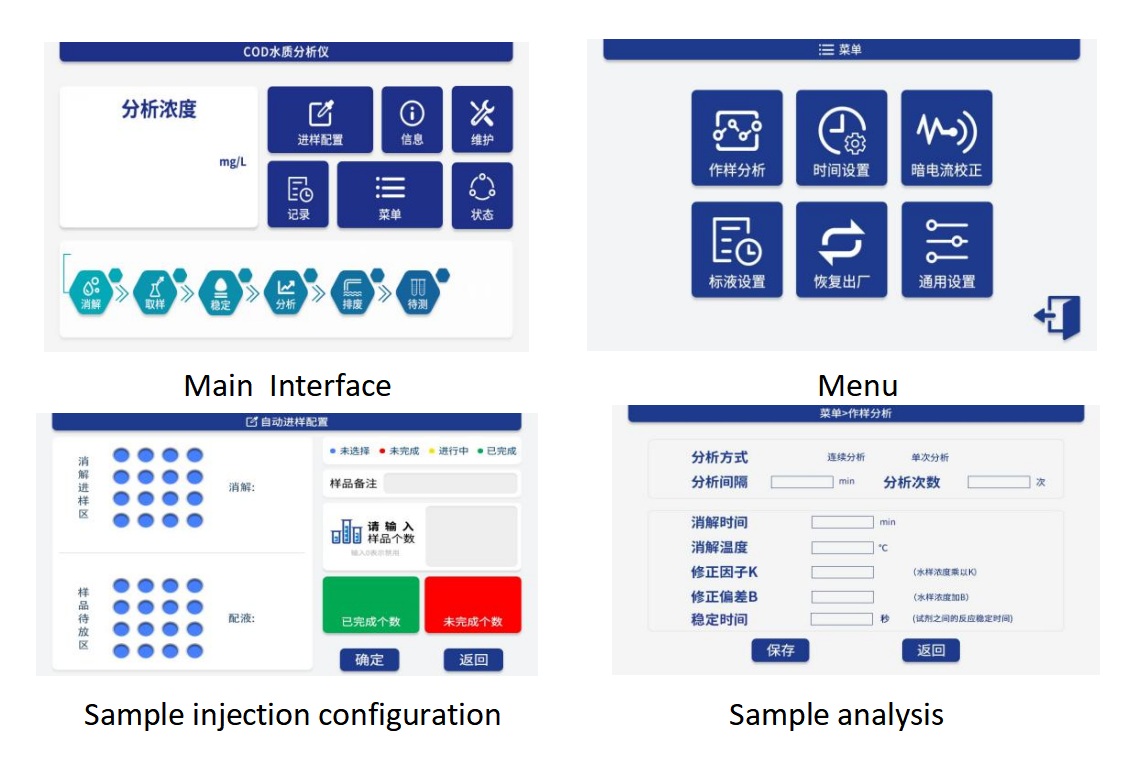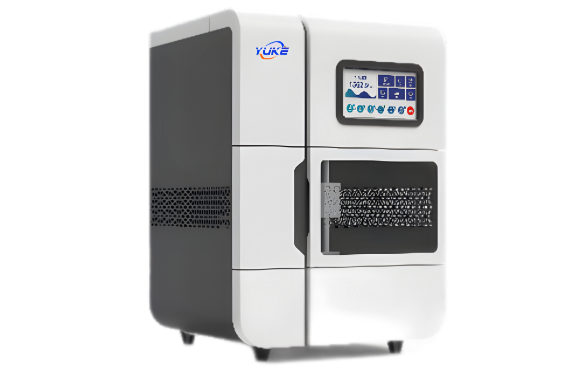Product Overview:
The traditional analysis of COD, total phosphorus, total nitrogen, ammonia nitrogen, residual chlorine, total chlorine, hexavalent chromium, nitrite, heavy metals and other photometric detection items is not only time-consuming, but also complicated and cumbersome to detect, and requires high skills of operators. It is difficult for water sample detection and recording to meet the analysis and testing needs of large quantities of samples. The fully automatic multi-parameter water quality analyzer is used for the automatic digestion and determination process of various water qualities, which automates the cumbersome and complex water quality analysis, unattended analysis, batch processing of water samples, freeing the hands of the testers, and providing accurate water quality analysis. It can be arbitrarily combined according to the needs of the test items, and meets the requirements of the national standard chemical oxygen demand determination rapid digestion spectrophotometry, Nessler reagent spectrophotometry, alkaline potassium persulfate digestion ultraviolet spectrophotometry, and ammonium molybdate spectrophotometry.
Instrument features:
1. The analysis system consists of four units, namely, automatic three-dimensional sampling unit, automatic digestion unit, high-precision spectrophotometer unit, and automatic control display unit. It has fault detection alarm function and memory function. After power failure, restarting the instrument can determine the unfinished analysis status and continue to complete the analysis, increasing the safety of system operation.
2. The operation setting is not less than 7 inches, automatic analysis, and the process is simple. The sample information is input into the control unit, and the automatic sampler automatically injects samples into the digestion and analysis unit. It has a sample addition function, and samples can be added at any time. The pipeline can be automatically cleaned during each measurement interval, ensuring the accuracy of the measurement results and the pollution-free sampling.
3. The instrument is equipped with a digester and cooling system. The analyst only needs to accurately extract the water sample and set the information of the sample to be tested on the instrument interface to avoid editing the sample information individually, improve work efficiency, and automatically measure the remaining steps, automatically digest, automatically cool, automatically discharge waste, and automatically generate and save reports. The closed structure design and automatic waste liquid discharge program avoid pollution to the environment during the test process.
4. No sample preparation process is required and pre-made reagents are used, which can greatly shorten the preparation time of reagents.
5. The instrument can digest 16 samples at the same time and has a fast water circulation cooling system, which improves the efficiency of analysis and testing. The analysis system adopts a fully automatic high-precision spectrophotometer with high wavelength accuracy and good stability. Corrosion-resistant and long-life design: It can repeatedly transfer 98% concentrated sulfuric acid and various corrosive organic and inorganic liquids such as strong alkali and organic solvents for a long time (corrosion-resistant DuPont polytetrafluoroethylene pipes, patented technology for remote liquid transfer, greatly extending the life of the precision injection pump).
6. Wide measurement range, strong anti-interference ability, the instrument has automatic sample dilution function (dilution method needs to be confirmed), automatic calibration function, and higher reliability and accuracy.
7. IoT cloud data upload function, Bluetooth transmission, USB interface, wifi module, support for cloud storage, WeChat applet, greatly facilitate the customer's application scenarios.
Instrument parameters:
Display: 7-inch color touch screen
Wavelength range: 190-1100nm
Photometric range: -0.3-3A
Wavelength repeatability: ±0.1nm
Wavelength accuracy: ±0.1nm (at 656.1nm), ±0.3nm full area
Stray light: 0.05T% (220nm, 360nm)
Optical stability: ≤0.001A
Light source: imported deuterium lamp, imported tungsten lamp
Printer: built-in thermal printer
Data communication: USB interface, RS-232 serial port
Light source life: 100,000 hours
Extended functions: photometric measurement, quantitative analysis, standard curve method, coefficient method
Colorimetric method: cuvette/colorimetric tube
Instrument power supply: AC220V/50Hz
Working environment: 5-40℃, ≤85% non-condensing
Water quality testing directory:
Test Items | Measuring range | Test method |
COD (chemical oxygen demand quantity) | 5-10000mg/L | Rapid digestion by spectrophotometry |
ammonia nitrogen | 0-100mg/L | Naer's reagent |
total phosphorus | 0-15mg/L | Ammonium molybdate spectrophotometry |
total nitrogen | 0-10mg/L | UV spectrophotometric digestion by alkaline potassium persulfate |
suspended matter | 0-100/100-1000/1000-4000mg/L | direct colorimetry |
residual chlorine | 0-15mg/L | spectrophotography |
Total chlorine | 0-30mg/L | spectrophotography |
chlorine dioxide | 0.05-30mg/L | spectrophotography |
Air formaldehyde | 0.05-1.5mg/m3 | Acetylacetone spectrophotometry |
Formaldehyde in water | 0.05-10mg/L | Acetylacetone spectrophotometry |
Textiles formaldehyde | 0.2-30mg/kg | Acetylacetone spectrophotometry |
turbidity | 0-1000(NTU) | The scattering ratio turbidity method |
tone | 0.001-500(PCU) | Platinum cobalt colorimetric method |
Beer color | 0-50(EBC) | photoelectric colorimetry |
Heavy metal hexavalent chromium | 010mg/L(piecewise) | Spectrophotometry of diphenyl carbacyl dihydrazide |
nitrite | 0-0.2mg/L | Naphthalene hydrochloride ethylenediamine |
nitrite nitrogen | 0.5-1.0mg/L | Naphthalene hydrochloride ethylenediamine |
nitrate nitrogen | 0.5-10mg/L | Phenolic disonate photometry |
nitrate | 0.5-10mg/L | Phenolic disonate photometry |
Permanganate, and the salt index | 0.2-10.0mg/L | Potassium permanganate oxidation spectrophotometry |
sulfate | 5-100mg/L | Barium chromate spectrophotometry |
phosphate | 0.05-20mg/L | Ammonium molybdate spectrophotometry |
ferri ion | 0.05-3mg/L | Phanthroline spectrophotometry |
copper ion | 0.05-3mg/L | Two base dithiocarbamylate sodium spectrophotometric method |
Heavy metal lead | 0.05-4.00mg/L | Of cresyl orange spectrophotometry |
prussiate | 0.0-1.0mg/L | The barbiturate spectrophotometry of isopicotinate |
arsenic | 0.05-3.00mg/L | Arsenic-antimony-molybdenum blue spectrophotometry |
aluminium | 0.0-1.0mg/L | Aluminum reagent spectrophotometry |
zinc | 0.01-5.0mg/L | Zinc reagent spectrophotometry |
manganese | 0.05 - 5.0mg/L | Potassium periodate spectrophotometry |
Heavy metal cadmium | 0-1mg/L | Spectrophotometry of the cadmium reagent |
Heavy metal nickel | 0.05 - 5mg/L | Diadione oximes by spectrophotometry |
sulfide | 0.0-1.0mg/L | Methylene blue spectrophotometer |
Volatil | 0.1 - 3.0mg/L | 4-aminoantipyrine spectrophotometer |
chlorid | 0.0-5.0mg/L | Silver salt photometry |
fluoride | 0.02.0mg/L | A Fluoride Reagent spectrophotometer |
Hardness in water | 0-50mg/L | Acid chromium-based lanthanum K-spectrophotometric method |
Software

Download
keyword search:Automatic multi-parameter water quality analyzer








 INQUIRY
INQUIRY







